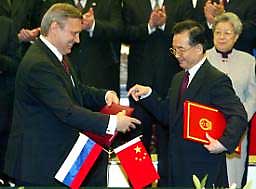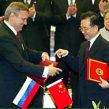
KREMLIN USES MIX OF OIL AND WEAPONS TO RESOLVE FAR EASTERN BORDER DISPUTES
Publication: Eurasia Daily Monitor Volume: 2 Issue: 12
By:

Moscow has offered Japan and China different packages to improve bilateral relations. Russia and Japan remain divided by the Kuril territorial dispute, despite recent moves to mend differences through energy cooperation. Meanwhile, Moscow has so far refrained from large-scale commitments in energy ties with China , seemingly trying to compensate with security ties and apparent territorial concessions.
Recent talks in Moscow between Russian Foreign Minister Sergei Lavrov and his Japanese counterpart Nobutaka Machimura served to highlight sharp differences between the two countries. “Our positions on the territorial issue are completely opposite,” Lavrov told a press conference after meeting with Machimura. Nonetheless, Moscow still seeks “mutually acceptable solutions” with Japan and the two sides should start large-scale cooperation, Lavrov said (Interfax, January 14).
No specific date has been set for Russian President Vladimir Putin’s planned visit to Tokyo . Earlier reports indicated February, to coincide with the 150th anniversary of the first treaty between Russia and Japan . However, the only announced result of the talks was Lavrov’s decision to visit Japan in the first half of March (Interfax, January 14).
It has been understood that Russia has little room for maneuvering in the territorial dispute with Japan . Now Moscow could only agree to continue negotiations in line with the spirit of 1956 Declaration. Tokyo’s insistence on its position could force Russia to renounce the 1956 Declaration and say publicly that there is no territorial dispute with Japan at all (Kommersant, January 14).
Last November, Moscow indicated it could hand over two of the four disputed Kuril Islands to Japan (see EDM, November 17, 2004). In an interview with NTV television Lavrov said, “The 1956 Declaration, which ranks among the former Soviet Union’s obligations, proposes that the two southern Kuril Islands be passed over to Japan to end the dispute.” Lavrov has said that Russia wants to “completely settle relations” with Japan , but the two sides must sign a peace treaty before any handover can take place.
Under the 1956 Declaration, the Soviet Union pledged to return Shikotan and Habomai after the peace treaty is signed, and retain the two other islands, Iturup and Kunashir. The islands are currently inhabited by a small number of Russian fishermen.
However, President Putin revised Lavrov’s statement and reiterated the principle of reciprocity in the territorial dispute with Japan . ” Russia has always fulfilled and will continue to fulfill all of its obligations,” Putin told the government on November 15, 2004. Russia will observe these obligations “only within the parameters our partners are prepared to honor,” Putin stressed. Subsequently, during a Kremlin press conference in late December, Putin seemingly ruled out an island handover to Japan .
Lavrov’s November statement evidently was a trial balloon to gauge Tokyo ‘s stance as well as Russian public reaction to this would-be compromise. However, Tokyo lost time in rejecting Russia ‘s overture, insisting that all four islands should be returned.
Yet despite continued sharp differences on the territorial issue, Moscow seems to seek economic dividends following its recent decision to build a Japan-bound East Siberia-Pacific oil pipeline (EDM, January 12). Russia expects to receive loans that would not be linked to procurement of Japanese equipment or technology, Russian Ministry of Energy and Industry Minister Viktor Khristenko announced.
The Russian government would not provide guarantees for the Taishet-Nakhodka pipeline project, although tax breaks could be possible. In the wake of a meeting with Foreign Minister Machimura, Khristenko also indicated that Russia’s and Japan’s interests regarding the Pacific-bound project “coincide” (Itar-Tass, January 17).
Despite all differences, Japan continues to help Russia dispose of its decommissioned nuclear submarines. Russia and Japan agreed to scrap five nuclear subs in 2005, according to Sergei Antipov, deputy head of the Federal Agency for Nuclear Energy (Rosatom). Japan is to provide some $40 million for the project (Vladivostok News, January 14).
The Russian-Japanese “Plan of Action” signed during Japanese Prime Minister Junichiro Koizumi’s visit to Russia in January 2003 involves dismantling decommissioned nuclear submarines. The action plan also aims at working out ways to increase their economic and international cooperation along with the talks for a peace treaty.
Japan cites a 1993 Tokyo declaration between the two countries, signed by President Boris Yeltsin, which said they would negotiate over the islands. In contrast, Russia tends to rely on the 2003 Japanese action plan as the basis for territorial settlement.
In the meantime, lawmakers in Sakhalin, which incorporates the Kuril Islands, have passed a resolution denouncing any territorial concessions. The islands’ return would amount to “a violation of the constitution and crime against the state,” Sakhalin lawmaker Ivan Zhdakayev declared. He also lashed out at the recent handover of two river islands to China, describing it a “rehearsal” for the Kurils.
In October 2004, Russia ceded two uninhabited islands and an uninhabited portion of another island to China, but the deal led to protests in the Khabarovsk region, which includes some of the islands. Lavrov said the same approach “based on strategic partnership” could be applied to the dispute over Kurils.
Putin’s October 14-16 visit to China served to boost their bilateral strategic partnership. China and Russia also signed an agreement in Beijing on final delimitation of the 4,300-km border, bringing an end to a decades-long negotiation process. In particular, Russia and China agreed to equally share the territory of Bolshoi Ussuriisky and the Tarabarov islands (known as Heixiazi Dao in China) on the Amur River near Khabarovsk, and Bolshoi Island on the Argun River. Russia and China had been struggling to find a mutually acceptable solution since 1991, however Moscow’s decision to cede two small islands sparked a measure of controversy.
Furthermore, Moscow indicated plans to sell advanced strategic weapons to China, including Tu-22M3 bombers, according to Air Force commander Vladimir Mikhailov. In the past, Russia has refused to sell the bombers to China because they represent “too powerful” weapons systems. Thus Mikhailov’s statement comes as proof of a change in Russia’s position, Russia’s state-run RIA-Novosti news agency commented. If China acquires the Tu-22M3, notably those armed with the latest Russian missiles, these bombers could be able to “threaten the Americans” around Taiwan, the agency speculated, quoting military experts. “China should buy at least two Tu-22M3 regiments (up to 40 aircraft), which would be enough to guarantee the destruction of a U.S. carrier group,” the agency said (RIA-Novosti, January 14). Tu-22M3 bombers are armed with Granit cruise missiles.
In recent years, China has been a top buyer of Russian military hardware, and it accounts for nearly half of Russia’s arms exports. China’s portfolio of orders to import Russian weapons is worth $6 billion, and these contracts are due to be completed by 2010, according to Russian media reports.
Yet despite a series of overtures towards Beijing, it remains unclear if Russia could eventually extend its oil pipeline from Siberia to China. Therefore, Moscow seems to be aiming at boosting its “strategic partnership” with China through military ties (and even territorial concessions), while refraining from major commitments in energy sector.
In relations with Japan, Russia arguably relies on a different tactic, trying to settle a territorial dispute by encouraging large-scale energy cooperation. As a result, Russia’s Far Eastern policies occasionally seem to be a series of ad hoc measures, possibly indicating a lack of coherence in Moscow’s decision-making process.




